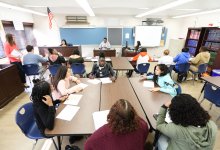Project-Based Learning (PBL)
Project-based learning is a dynamic classroom approach in which students actively explore real-world problems and challenges and acquire transferable knowledge.
How to Quick-Launch a PBL Initiative
Start with just a two-hour session to identify goals for project-based learning and get your implementation team on board.140Your content has been saved!
Go to My Saved Content.Integrating Technology Into PBL
Weaving technological skill-building through project-based learning units gives students agency in how to express their knowledge.Your content has been saved!
Go to My Saved Content.How Accessible Tech Can Promote Empathy and Collaboration
A middle school design and technology teacher breaks down a three-project unit that nicely overlaps with STEAM content.Your content has been saved!
Go to My Saved Content.Using a Learning Map to Build Exemplary PBL Units
By developing—and revisiting—an instructional roadmap that connects standards, activities, and skill development, these teachers put students on a path toward mastery.Using AI Tools to Support Project-Based Learning
Teachers can use an artificial intelligence framework when developing projects to provide well-rounded learning experiences.Creating Authentic Learning Experiences in Early Childhood Classrooms
Bringing in outside experts and doing fieldwork can make project-based learning an invaluable experience for young learners.150Your content has been saved!
Go to My Saved Content.Teaching Students to Use Chunking to Tackle Complex Problems
Middle and high school teachers can show students how to break projects into smaller parts to support their ability to manage their work.147Your content has been saved!
Go to My Saved Content.Combining PBL and Play in Early Childhood Classrooms
Teachers can integrate play in early elementary classrooms to align students’ developmental needs with academic goals through PBL.311Your content has been saved!
Go to My Saved Content.How Students Can Use AI in Project-Based Learning
Teachers can guide students to leverage AI for feedback in choosing and presenting a learning artifact—and they still create that themselves.676Your content has been saved!
Go to My Saved Content.Empowering Pre-K Students Through Project-Based Learning
Young students can build agency and independence when given the opportunity to make decisions throughout the PBL process.7 Projects Teachers Stand By
Planning for projects can be difficult and time-consuming. This list of teacher-tested projects—complete with printable resources—should offer a big head start.Designing Science Inquiry: Claim + Evidence + Reasoning = Explanation
The Claim, Evidence, Reasoning framework is a scaffolded way to teach the scientific method.30.3kYour content has been saved!
Go to My Saved Content.Launching a PBL Unit With Preschool Students
Take advantage of young students’ natural curiosity through project-based learning that invites them to generate questions they care about.314Your content has been saved!
Go to My Saved Content.Inquiry-Based Tasks in Social Studies
Assignments that are bigger than a lesson and smaller than a unit are a good way to experiment with inquiry-based learning.10.6kYour content has been saved!
Go to My Saved Content.6 Strategies for Differentiated Instruction in Project-Based Learning
Reflecting on learning and student voice and choice are core elements of project-based learning, and they’re also key to differentiation.14.2kYour content has been saved!
Go to My Saved Content.













